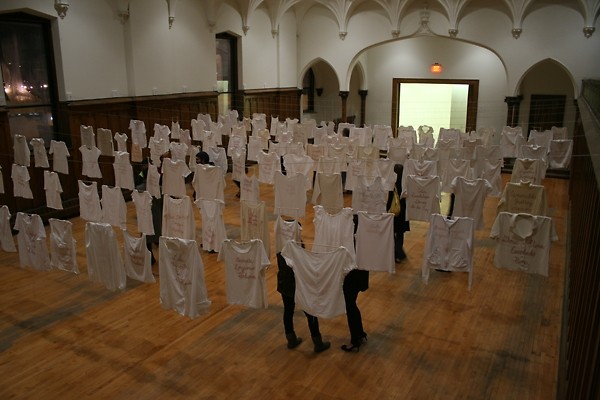Voces ("Voices"), a solo exhibition by Mandy Cano Villalobos, addresses the mass femicide in the state of Chihuahua, Mexico. Femicide is historically defined as the systematic killing of women by men simply because they are women. In Ciudad Juarez, Mexico the murders are also known as las muertas de Juarez ("the dead women of Juarez").
The exhibition is a haunting reminder of how I recently learned about the mass femicides in Juarez through GRCC's Diversty Lecture Series. As part of her presentation, Barbara Martinez Jitner paints a solemn picture of the suffering and femicide these young women endure as a result of working in the American-owned factories (or maquilas) of this Mexican town. Since 1993, over 475 women have been raped, abducted and murdered, while their perpetrators are never brought to justice. These young girls disappear, never to be heard from again.
Cano Villalobos has spent the last two years embroidering the name of each murdered woman and investigating the stories of their lives. The artist recalls growing up in El Paso, Texas as a child, the daughter of parents who both served in the Army and were stationed there. She remembers with fond memories journeys to Juarez and yet, finds a disturbing incongruence now with what she hears on the news. Her shock, disgust, and sorrow compell her to use her artistic expression to address the femicides happening in Juarez.
This solo exhibition is an ongoing act of mourning and protest. She writes in her artist statement, "As the needle pierces each shirt, the suffering of each woman is lamented and recorded in thread. Though their lives and bodies have been so carelessly discarded, these women are not forgotten. The time taken to hand-stitch one name is a time taken to remember one person; it is to lovingly declare, "No, you are not forgotten. I remember you. I value you."
Entering the expansive exhibition space for Open Concept Gallery, I was confronted with rows of white garments - t-shirts, tanks, blouses, and camisoles - all embroidered in pink thread. As Cano Villalobos indicates in her artist statement, "the thread references the pink crosses that have been erected and painted throughout the city by those who mourn the dead." As I move through the rows to the upper balcony, I am forced to feel the fabrics softly brush against my face. Weaving through the shirts that hang at eye level, I find each name delicately embroidered in the pink threads - Lilia Alejandra Garcia Andrade, Neyra Azucena Cervantes, Maria Sagrario Flores - their names continue on and on.
Along one wall of the balcony are displayed missing person posters, newspaper articles and photographic documentation of the found bodies. This passageway leads to an arcade of arches, supported by columns, in which are displayed seven individual candlelit shrines. Many of the shrines honor daughters whose mothers have gone on to form organizations to help others effected by this travesty. The altars present traditional items, such as food, photographs, personal belongings and brightly colored decorations, typical of those seen in the Dia de los Muertos celebration.
Cano Villalobos, who has a degree in painting from George Washington University, currently teaches at Calvin College and has engaged several of her students in the collaborative art-making process. They sit on the upper balcony in a small circle, with layers of garments stacked on the wall behind them. Traditional Latin American music is played in the background by Julio Cano, who also happens to be the artist's husband.
Overlooking the sea of shirts from the upper level against lightly colored hardwood floors, I can almost imagine looking across the expanse of isolated desert fields. It's in this place where young women's bodies have been found, beaten and tortured, mutilated and raped, left for dead. I imagine the mothers and family members searching for fragments of fabric and personal belongings of their missing daughters. It's a powerful and somber experience, compelling me to want to do something to raise awareness and stop this violence in some way.
It's this same outrage that compels the artist in the creation of the installation. In this way, Open Concept Gallery is a perfect venue for the display of her work. The gallery encourages dialogue between the artist and audience. They seek installations that are devoted to the integration of art into every aspect of daily contemporary life. As Barbara Martinez Jitner relayed in her lecture, “These young girls are part of our lives every day. They help build our lives.” Indeed, not one of us has been left untouched by the result of their work and struggles.
Viewers to the exhibition assume an implied responsibility as consumers of these company's products, many of which are household names (General Electric, Johnson and Johnson, Du Pont, Sony, Ford, etc.) While Cano Villalobos does not intend for Voces to point fingers, she presents the problem as a very real and urgent dilemma and encourages us to consider those who suffer under the current system and how we might act responsibly in women's favor. The opening reception also happened to be on the eve of the U.S. Senate's hearing on women's human rights. A vote to ratify the Convention on the Elimination of All Forms of Discrimination Against Women (CEDAW) has been a long time coming, and this will be the first time in eight years that the U.S. Senate has focused solely on one of the most powerful global tools for protecting women's rights.
Cano Villalobos provides background information for viewers in support of her solo exhibition. Biographies of several young women who were killed, an artist statement, an overview of the social and economic context of the femicides, and a list of organizations working to end femicide in the state of Chihuahua are available at the gallery.
Through her work, Mandy Cano Villalobos makes sure these women are remembered. They are valued, they are not forgotten.
The Rapidian, a program of the 501(c)3 nonprofit Community Media Center, relies on the community’s support to help cover the cost of training reporters and publishing content.
We need your help.
If each of our readers and content creators who values this community platform help support its creation and maintenance, The Rapidian can continue to educate and facilitate a conversation around issues for years to come.
Please support The Rapidian and make a contribution today.




Comments
Nancy, what an incredible article. I'm so glad you have shed more light on this issue which, I have to admit, I was not aware of. Kudos to you and Mandy (and everyone else who is raising awareness surrounding this obviously important matter). It is sickening to think that such terrible crimes are occurring and I am very impressed by your ability to share this information in a way that really "touches" the reader. Your words make a truly disturbing situation (the femicides, not the art exhibition) sink in with great clarity. Your descriptions of the situation, and the art exhibition, are pure artistry; I felt as though I was there experiencing the art exhibition myself. A great article. Many thanks and it is nice to see your voice here as well.
Joel - Thanks for your comments. That means alot to me. Sorry just seeming them now. It was a challenging article to write, but really glad you enjoyed it and also learned from it as well. Hope to see more of your writing on The Rapidian. Nancy